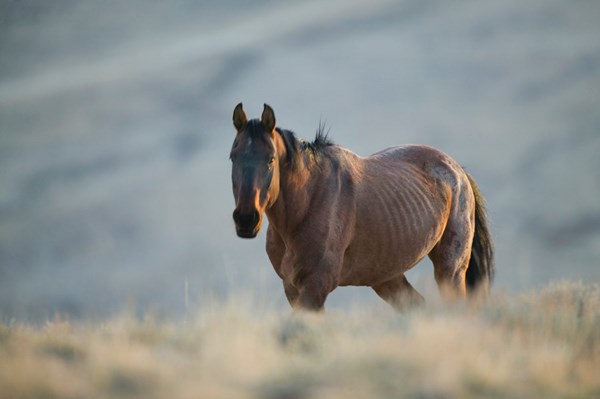
Horse owners deworm their horses for many reasons, primarily as a way to sidestep colic, life-threatening roundworm impactions in young horses, slow growth, weight loss, and poor hair coats. As a group, those conditions are referred to as parasite-related diseases. But does deworming really help horses with digestion and maintaining condition?
“It is widely accepted that adult horses that are not dewormed and have heavy infestations of internal parasites suffer chronic weight loss,” shared Kathleen Crandell, PhD, Kentucky Equine Research (KER).
Weight loss is presumably due to damage by the emergence of small strongyles from the large intestine, ultimately preventing horses from absorbing nutrients from their feed.
To date, however, that theory has yet to be proven. In an attempt to shed more light on the impact of large, natural infections of internal parasites on digestion and body weight of horses, researchers* recruited two groups of mares, 10 mares in each group, in the first trimester of pregnancy.
None of the mares in either group had been dewormed in the preceding 12 months, and all mares had heavy worm burdens, primarily small strongyles. Both groups of mares had fecal egg counts greater than 6,000 at baseline. Current recommendations are to deworm horses when fecal egg counts are greater than 200 eggs/gram of feces. One group of mares was dewormed with a commercial product containing moxidectin, while the other was not.
Key findings were:
- Following administration of moxidectin, mares were successfully dewormed with fecal egg counts of 0 eggs/gram of feces throughout the trial;
- Mares that were not dewormed continued to have very high fecal egg counts, greater than 5,000 eggs/gram of feces; and
- No difference in any outcome measure was noted between the two groups of mares. This included basic red and white blood cell counts, apparent digestion of nutrients, and weight gain or body condition.
“Although the results initially suggest that heavy infestations of small strongyles did not adversely affect mares in terms of body weight, condition or digestion, the study authors did note some concerns with their study design that might have influenced the results,” noted Crandell.
The most important caveat in the study is that included mares were fed a 20% corn-based concentrate. Starch and proteins in such a diet are primarily digested in the small intestine, but damage caused by small strongyles is thought to occur in the large intestine. The authors therefore suggested that future studies should include a diet that is primarily metabolized and digested in the large intestine, such as roughage-based diets.
The study authors also noted that the mares included in this study might have been too young (age range 3-8 years) to have sufficient damage to the large intestine due to small strongyle populations for a difference in digestion to be identified. They suggested that older horses (more than 20 years old) might have accrued sufficient parasite-related damage to the large intestine, and aged horse populations should be studied in future.
“Additional research is certainly warranted,” affirmed Crandell.
*Silva, R.H.P., A.S. Carneiro de Rezende, E.D.S. Saliba, et al. The effect of deworming on apparent digestion, body weight and condition in heavily parasitized mares . Journal of Equine Veterinary Science. In Press.
Visit equinews.com/newsletters to subscribe to The Weekly Feed, KER’s award-winning equine nutrition newsletter.


